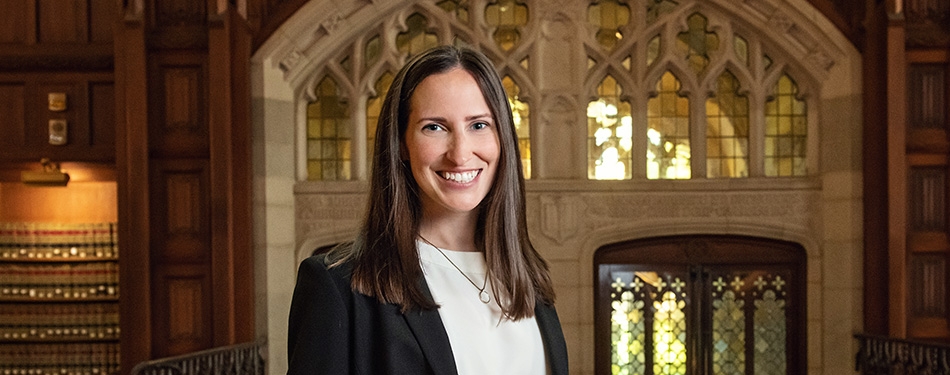Patent attorney and Zell Entrepreneurship Clinic adviser Kristen Wolff joins Michigan Law faculty full time.
Kristen Wolff, a patent attorney, joins Michigan Law’s faculty as a clinical assistant professor of law, after spending the past year as a visiting clinical assistant professor at the Zell Entrepreneurship Clinic.
Wolff has found that when people discover she is a patent attorney, they often tell her about their ideas for inventions. But very few are able to pursue the patents that might help turn their inspiration into a business.
The patenting process is so expensive that, for most people, pursuing a patent is just not possible. And yet, in many industries, a patent is critical to entrepreneurial success. So what I’m really interested in is figuring out, how do we remove barriers to patenting?
“People of so many different life experiences have good ideas,” said Wolff.
“I talk with people that I meet, and they’ll say, ‘Oh, I had an idea for an invention once!’ And they’ll tell me a little about it. But the patenting process is so expensive that, for most people, pursuing a patent is just not possible. And yet, in many industries, a patent is critical to entrepreneurial success. So what I’m really interested in is figuring out, how do we remove barriers to patenting?”
The main issue, Wolff said, is the cost of a patent attorney, whose job is to help an inventor prepare and file a patent application, as well as to represent their client through the patent examination process with the U.S. Patent and Trademark Office.
Making patent law accessible for inventors and student-entrepreneurs
In 2013, President Obama signed a series of executive actions to “level the playing field for innovators,” including by expanding the availability of pro bono intellectual property representation and by providing new resources to inventors looking to represent themselves.
At Michigan Law, Wolff plans to research the impact of these programs, and she also hopes to create learning modules that can help inventors better understand patent law and patent drafting, so people with more imagination than money can navigate the patenting process on their own.
“Inventors are smart,” she said. “Can we teach them how to draft effective, successful patent applications themselves, so that those who can’t afford an attorney can still protect their ideas and pursue their entrepreneurial dreams? Can we make the innovation ecosystem more inclusive?”
Wolff, who earned bachelor’s and master’s degrees in biomedical engineering at the University of Michigan before going on to law school at Duke University, spent six years as a patent strategist and attorney at firms in California.
In her practice, she helped biotech and medical device startups protect their intellectual property (one highlight was a company that developed one of the first at-home molecular test kits now used for rapid COVID-19 testing).
She returned to Ann Arbor in 2017 as associate director of licensing at U-M’s Office of Technology Transfer, a role that led to frequent guest lectures at Michigan Law and at the College of Engineering on topics such as patent searching and intellectual property strategy.
Last year, as a visiting professor at Michigan Law, she also supervised student-attorneys as they gave pro bono legal advice to local entrepreneurs, including student-entrepreneurs.
“So many students at the University of Michigan are entrepreneurial,” she said. “Engineering students are a really fun group to give patent seminars to because this information is immediately practical and relevant to them. I think it’s important for every engineer to at least have a basic understanding of intellectual property law, whether it’s so they can understand their employers’ IP policies, or to help their own technology businesses succeed.”
Bringing engineering and law training and experience to the clinic and classroom
While Wolff knew she wanted to be an attorney from a young age, her engineering experience provided her with the technical expertise required of a patent lawyer, as well as an appreciation for the thrill of innovation.
It’s gratifying, she said, when her lectures and advice inspire aspiring entrepreneurs.
“I often assign students to do a patent search for their ideas, and it’s empowering when they realize, ‘No, actually, no one has thought of this before,’” she said. “Or sometimes they’ll find something similar and they come to class discouraged, and I help them analyze it and figure out that there’s some nugget of novelty that no one’s thought of before.”
These students’ enthusiasm also drives home for Wolff the importance of removing the obstacles that can put entrepreneurship out of reach.
“Often students are very surprised, and sometimes quite discouraged, to hear just how long the process takes and how expensive it can be,” she said. “These are really smart students who are good at communicating, good at writing. They invented their own technologies.
“They should be able to write their own effective patent applications. I think they could with the right tools, and that’s what I hope to create.”
—Amy Crawford

